Bosnia and Herzegovina is simply majestic—Brooding, dramatic mountains sweep down to give way to scenic parades of rolling hills and tranquil meandering rivers. Accompanying this kaleidoscope of natural beauty, this small nation boasts a rich culture and history.
The Balkans are a lesser-known collection of countries in southeast Europe. The magic of the Balkans is that while each country is simultaneously so different from one another, they also have much in common, including language and history. Most of these boundaries have changed countless times over history, and some of them fall under the umbrella of Europe or Asia.
Traditionally speaking, these countries are usually associated with the Balkan Nations: Albania, Bosnia and Herzegovina, Bulgaria, Greece, Kosovo, Montenegro, and North Macedonia. Other countries are on the periphery and can be viewed as being more “European,” like Slovenia or (now Schengen) Croatia or even Turkey, which straddles Europe and Asia.
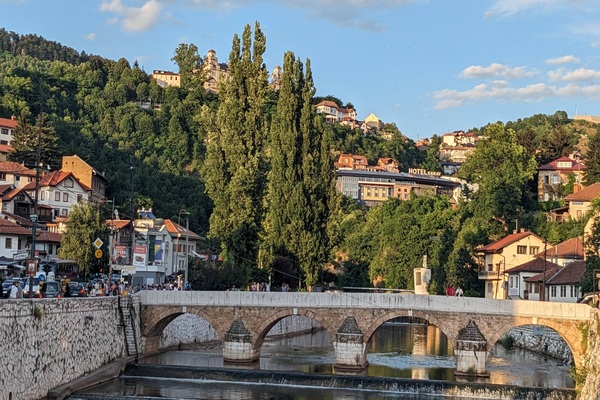
Bosnia and Herzegovina is, admittedly, a mouthful to say and to write. The name can be abbreviated to BiH or B&H or hyphenated with a dash, but the most acceptable method is Bosnia alone, without the Herzegovina. That makes geographical sense since the country is 80 percent Bosnian land, with just the southern section known as Herzegovina.
Of the 3.5 million residents of Bosnia, nearly half live within cities, and the country of just under 20,000 sq miles (51,200 sq. km) is the 129th smallest country in the world. The capital city of Sarajevo is the largest in the country, with almost 300,000 residents, followed by Banja Luka. Still, aside from Sarajevo, the other city that many may be familiar with is Mostar—home of the famous Stari Most or Mostar Old Bridge.
Most of us who know our relatively recent history may recall that the Ottoman (Turkish) Empire spanned over 600 years, controlling much of the Middle East, Asia, and Eastern Europe, and ended just a century ago as one of the outcomes of World War I. Much of their architecture and cities still retain much of their influence, and staying in Sarajevo for a few days was reminiscent of Turkey. That city is sometimes referred to as a smaller, cleaner, less busy version of Istanbul. I agree!
Here are five reasons why you should consider visiting Bosnia and Herzegovina:
1. Scenery & Geography
Personally, I love the Balkans as I’m a big fan of mountains, lakes, and rivers. What Bosnia lacks in coastline, it more than makes up for it with other water features. When the gigantic nation of Yugoslavia was split up, Bosnia was only given 12 miles of coastline. To make matters worse, until 2023 you had to go through Bosnia to get to Dubrovnik in Croatia if you were driving from the northern part of the country. They recently opened the Pelješac Bridge, meaning Croatian drivers no longer have to go through Bosnia. It’s like a bypass that totally avoids a city, but in this case, the entire nation of Bosnia is getting skipped over.
Our initial target city of Mostar also got bypassed, and we ended up in the region of Prozor-Rama, which was spectacular. Our little hotel in Scit was on a strip of land dividing two separate lakes in the Rama area, and majestic mountains surrounded the entire valley. Getting there was only half the fun as we entered Bosnia and traversed highway R417, which ran alongside another lake, Busko Blato.
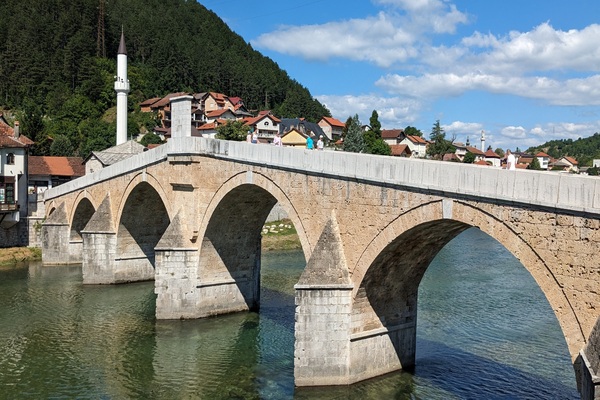
But the real beauty came as we left our small room and drove along highway M16.2, spending two nights outside the city of Konjic, right above the Neretva River. In that city they have a bridge very similar to the Mostar Bridge, which we discovered was rebuilt by the Turkish government after it was destroyed in the 1990s.
When I reflect on our time in BiH, the word that comes to mind is “dramatic.” It’s an overlooked natural beauty that deserves closer inspection.
2. History & Culture
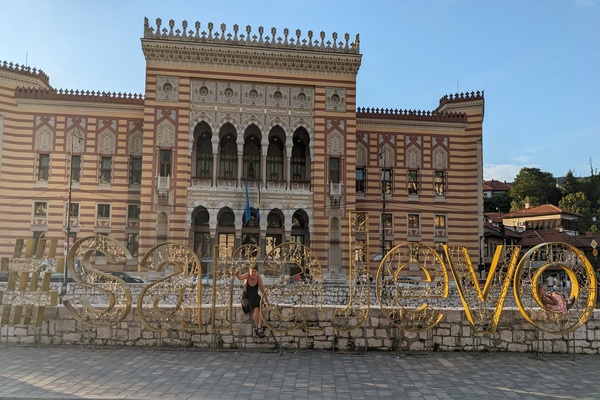
Bosnia boasts a rich historical tapestry, and the capital city of Sarajevo carries most of the weight. In 1914, Archduke Franz Ferdinand was assassinated while in a motorcade in the city. This event would prove the catalyst for WWI and triggered a period of monumental upheaval in Europe. During this time, there was a tremendous crossover of Bosnians, Serbs, and Croats, all fighting for superiority and expansion of their borders.
Until then, the Balkans were under the rule of the Ottoman Empire. After the war ended, along with Turkish control, the dissension and animosity continued for many decades. That culminated in the Bosnian War, which erupted in 1992 and lasted three years. The fighting took place over a large part of the Balkans, but even today there are landmines in the Bosnian countryside. The country remains very proud of its involvement in that process, and Sarajevo burns an eternal flame in memory of those lost lives. Other smaller cities also paid tribute to their soldiers and victims in memorials as well.
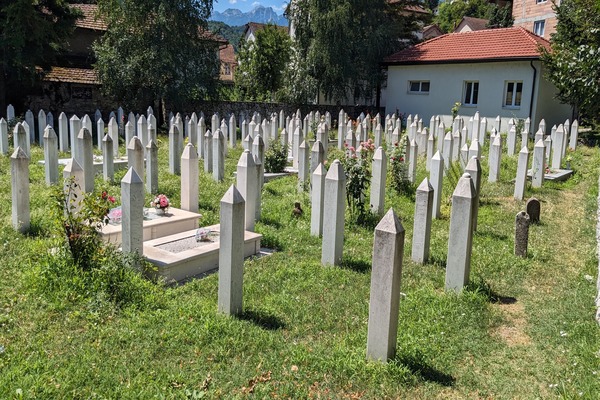
On a more positive note, Sarajevo was one of the few cities to host the Olympics, which it did in 1984. Many of the venues still exist, and the Bosnians take their winter sports very seriously!
3. The Food & The People
We’ve been overwhelmed by the spirit and friendliness of the Balkan people, and Bosnia contributed to those feelings. Everyone we met was able to communicate in English, and they were delightful in helping us when we needed it.
We arrived in Sarajevo on a Friday afternoon without a plan or room. Surrounded by hills, we tried to stay away from them and instead, found a room in the Old Town, which is usually our preference. After stopping in a few hotels and finding them too pricey, we asked a waitress at a restaurant if she knew of any Airbnb or hostels. She took us around the corner and introduced us to a lady who was finishing cleaning out a lovely (and large) one-bedroom apartment. Our waitress guide was bi-lingual and helped us book the room for the night, which was centrally located in the city and close to everything. Sweet!
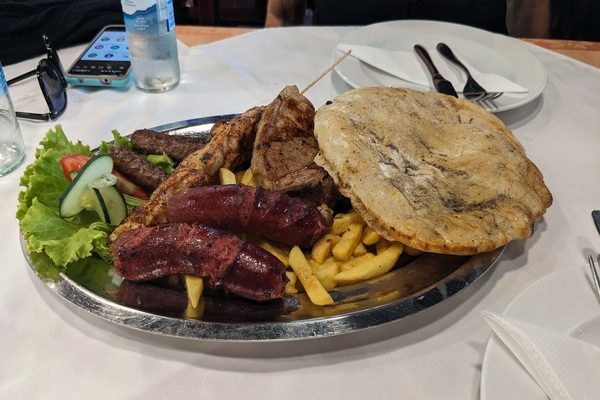
The food in Bosnia was a combination of Turkish, Hungarian, and Balkan tastes, and centered on veal, pork, and the more healthy vegetarian soups and Borscht. Cevapi, which are grilled meat patties or sausages, are available everywhere, and one of my personal favorites.
4. Affordability
Since we constantly live “on the road,” with no permanent residence, the affordability of places we go is a dominant factor… which is why we love the Balkans! While some Balkan states are more expensive than others, you will generally see your money go much further than you would in the U.S.
We lived in Albania for eight months and found it eminently affordable, and Bosnia wasn’t much pricier. Our nice room in Sarajevo, which was larger than what we needed, was €60, whereas the other rooms we stayed out in the more rural areas were less than half that. We enjoyed several nice dinners of fish and game for about $10 per person, and beer and wine were about $3 each.
5. Crowds (or Lack of Them)
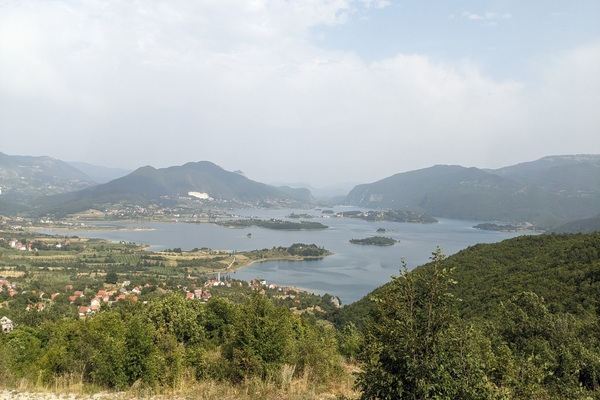
The Balkan countries are an interesting checkerboard of similarities and differences; some are officially part of Europe, i.e., the European Union (EU), but not necessarily part of the Schengen Zone, which limits visa times. Bosnia isn’t officially Europe, nor is it Schengen, so it fits a great need for nomads like us who need to take a 90-day break to reset our Schengen clock. Currently, Romania and Bulgaria, officially part of Europe but not Schengen, are under review for inclusion, but nothing is final yet.
Bosnia fills a nice void for nomads who used to go to Croatia to reset their Schengen time. Bosnia touches Croatia along much of its border, as well as Montenegro, for those “jetsetters” who go to Montenegro for that. Aside from the legalities and border aspects, Bosnia is great since it was not crowded.
We were there from the end of July through the beginning of August—prime holiday season for most of Europe—and aside from some business in the capital city, it was calm everywhere. Virtually no traffic, no lines, no hassles!
Many of you reading this may be nomadic or maybe thinking (dreaming?) of living outside your home country. “Different Strokes for Different Folks,” goes the saying, but if you like an affordable place to live, one with natural beauty, great food, and lovely people, I suggest you allocate a good portion of your calendar to check out Bosnia-Herzegovina.

Get Your Free Report on Europe Here:
Learn more about countries in Europe and other countries from around the world in our daily postcard e-letter.
Simply enter your email address below and we'll also send you a FREE report - All the Charm and Romance of Europe…at a Price You Can Afford.
Related Articles
Is Slovenia Europe’s Most Underrated Gem?
The Best Towns and Cities to Retire in Europe
Why More and More Americans Are Choosing Europe
Upcoming Conferences
The Only 2024 Fast Track Panama Conference
If your dream retirement involves stunning beaches… lush green mountains… a warm climate with no hurricanes… first-rate healthcare… incredible value for money (a couple can live well on $2,200 a month)… and the World’s #1 Retiree Discount Program…
Join our Panama experts and expats in February and discover why Panama could be your perfect paradise.
REGISTER NOW, SEATS LIMITED: EARLY BIRD DISCOUNT HERE

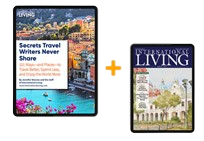
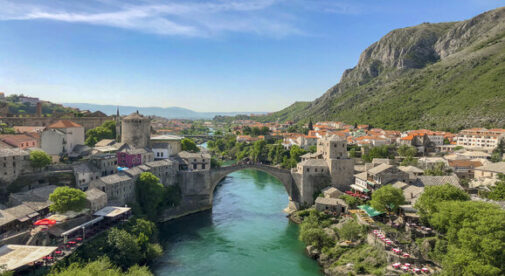
.png)